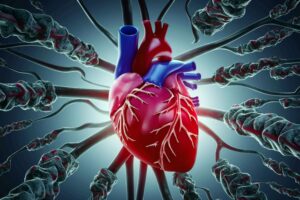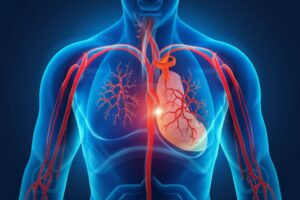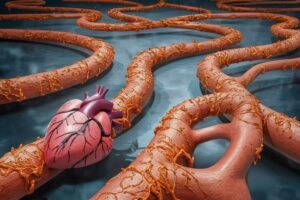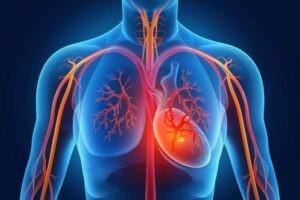The Impact of Arteriosclerosis on Cardiovascular Health
Arteriosclerosis, a condition characterized by the thickening, hardening and narrowing of arteries, poses a significant threat to cardiovascular health worldwide. Understanding the impact of arteriosclerosis on the heart and blood vessels is crucial in preventing and managing related complications.
This article provides an in-depth exploration of arteriosclerosis, including its causes, effects on cardiovascular health, diagnostic methods, treatment options, and preventive strategies. By delving into the complexities of this condition, we aim to shed light on the importance of addressing arteriosclerosis for overall cardiovascular well-being.

Table of Contents
ToggleIntroduction to Arteriosclerosis
Arteriosclerosis is a chronic condition characterized by the thickening and hardening of the arteries, which can lead to a reduction in blood flow and increase the risk of cardiovascular disease.
This condition is typically caused by the build-up of plaque on the arterial walls, which is made up of cholesterol, fat, and other substances. Over time, this plaque can narrow the arteries and restrict the flow of oxygen-rich blood to the organs and tissues, increasing the risk of heart attack, stroke, and other serious health complications.
Arteriosclerosis is a complex and multifactorial disease that can be influenced by a variety of factors, including genetics, lifestyle choices, and underlying medical conditions. While age is a significant risk factor for developing arteriosclerosis, younger individuals can also be affected by this condition due to poor dietary habits, lack of exercise, and smoking. Diagnosis of arteriosclerosis typically involves a combination of physical exams, blood tests, and imaging studies, such as ultrasound or angiography.
Treatment options for arteriosclerosis may include lifestyle modifications, medication therapy, and in some cases, surgical interventions to improve blood flow and reduce the risk of complications associated with this condition.
Read more about “The Link between Adrenal Stress Fat and Stubborn Belly Fat!”
Effects of Arteriosclerosis on Cardiovascular System
Arteriosclerosis, also known as hardening of the arteries, is a condition characterized by the narrowing and hardening of the arteries due to the buildup of plaque. This condition can have detrimental effects on the cardiovascular system, as it restricts blood flow and oxygen delivery to the body’s tissues and organs.
The narrowing of the arteries increases the workload on the heart, leading to an increased risk of heart disease, heart attacks, and strokes.
Furthermore, arteriosclerosis can also lead to complications such as hypertension and peripheral artery disease, which can further impact the cardiovascular system. The reduced blood flow caused by arteriosclerosis can result in damage to the arteries and the heart muscle, leading to heart failure.
Additionally, the reduced oxygen supply to the brain can result in cognitive impairment and memory loss. Overall, arteriosclerosis has a significant impact on the cardiovascular system, affecting not only the heart but also the brain and other vital organs.
Managing risk factors such as high cholesterol, hypertension, and diabetes through lifestyle modifications and medication can help prevent or slow down the progression of arteriosclerosis and reduce its negative effects on the cardiovascular system.
Read more about “What is Phosphatidylcholine and it’s Essential Role in Cellular Health?”
Types of Arteriosclerosis
Arteriosclerosis is a common condition that refers to the thickening and hardening of the arteries, which can restrict blood flow and increase the risk of heart disease and stroke.
There are several types of arteriosclerosis, each with its own unique characteristics and effects on the body.
The most common type is atherosclerosis, which occurs when fatty deposits, known as plaque, build up on the inner walls of the arteries. This can lead to the narrowing of the arteries and eventually blockages, which can cause serious cardiovascular problems.
Another type of arteriosclerosis is Monckeberg’s arteriosclerosis, which affects the middle layer of the arteries and can lead to the calcification and hardening of the arterial walls.
In addition to atherosclerosis and Monckeberg’s arteriosclerosis, there are other less common types of arteriosclerosis, such as arteriolosclerosis and arteriosclerosis obliterans. Arteriolosclerosis affects the small arteries and arterioles in the body, leading to thickening and hardening of the vessel walls. This can result in decreased blood flow to tissues and organs, impacting their function and possibly leading to complications.
Arteriosclerosis obliterans, on the other hand, results in the narrowing and blockage of arteries in the extremities, particularly in the legs. This can cause symptoms such as pain, numbness, and weakness, and if left untreated, can lead to serious complications such as gangrene and amputations.
Understanding the different types of arteriosclerosis is important for diagnosis and treatment, as each type requires a specific approach to managing the condition and reducing the risk of complications.
Read more about “What are the Causes and Symptoms of Amputation Disease and How to Treat?”
Causes of Arteriosclerosis and Risk Factors for Development
The exact cause of arteriosclerosis is not fully understood, there are several factors that are believed to contribute to its development. One of the primary causes is the buildup of cholesterol and other fatty substances in the arteries, which can lead to the formation of plaque.
In addition, high blood pressure, diabetes, smoking, and a sedentary lifestyle are all known to increase the risk of developing arteriosclerosis. Genetics also play a role, as individuals with a family history of cardiovascular disease are more likely to develop the condition.

Several risk factors have been identified that can increase the likelihood of developing arteriosclerosis. These include age, with the risk of arteriosclerosis increasing as individuals get older. Gender also plays a role, with men being at higher risk than women. Other risk factors include obesity, high levels of LDL (low-density lipoprotein) cholesterol, and low levels of HDL (high-density lipoprotein) cholesterol.
Additionally, individuals with a history of smoking, high blood pressure, diabetes, or a sedentary lifestyle are also at greater risk of developing arteriosclerosis.
It is important for individuals to be aware of these risk factors and take steps to reduce their likelihood of developing the condition through lifestyle changes such as avoid smoking, exercising regularly and strict maintaining a healthy diet.
Read more about “What are the Causes and Symptoms of Gangrene Disease and How to Treat?”
Pathophysiology of Arteriosclerosis
Arteriosclerosis is a complex disease process that involves the progressive thickening and hardening of arterial walls due to the accumulation of plaque.
The pathophysiology of arteriosclerosis begins with damage to the endothelium, the inner lining of blood vessels, which can be caused by various factors such as smoking, hypertension, and high levels of cholesterol. This damage triggers an inflammatory response, leading to the recruitment of immune cells and the deposition of lipids, particularly low-density lipoproteins (LDL), within the arterial wall.
Over time, these lipids undergo oxidation and become engulfed by macrophages, which transforms them into foam cells. The accumulation of foam cells and other inflammatory cells within the arterial wall forms a fatty streak, which eventually evolves into a fibrous plaque through the production of collagen and smooth muscle cells.
As the plaque continues to grow, it narrows the arterial lumen and impairs blood flow, increasing the risk of ischemic events such as myocardial infarction and stroke. In addition, the plaque may become unstable and rupture, leading to the formation of a thrombus that can further obstruct blood flow or embolize to other areas of the body.
The progression of arteriosclerosis can also lead to complications such as aneurysm formation, as the weakened arterial wall is unable to withstand the pressure of blood flow. Ultimately, the pathophysiology of arteriosclerosis involves a complex interplay of inflammatory processes, lipid accumulation, and structural changes within the arterial wall, resulting in formation of atherosclerotic plaques that leads to the death linked with cardiovascular disease.
How Arteriosclerosis Affects Blood Flow in the Arteries?
Arteriosclerosis can significantly impact the flow of blood throughout the body. As the arteries become narrower and less flexible due to the accumulation of plaque and calcium deposits on the arterial walls, the flow of blood is restricted.
This decreased flow of blood can lead to a variety of serious health problems, including hypertension, heart attack, and stroke. The build-up of plaque can also cause clots to form, further obstructing blood flow and increasing the risk of cardiovascular events.

Moreover, arteriosclerosis can also affect the ability of the arteries to dilate and contract in response to changes in blood flow or pressure. This impaired ability to regulate blood flow can result in decreased oxygen and nutrient delivery to tissues and organs, leading to a range of symptoms such as chest pain, fatigue, and shortness of breath.
Additionally, the reduced flow of blood can impact the function of vital organs such as the brain and kidneys, potentially resulting in organ damage or failure. In short, arteriosclerosis not only restricts blood flow in the arteries, but also disrupts the body’s ability to maintain proper circulation, ultimately increasing the risk of severe health complications.
Impact of Arteriosclerosis on Overall Cardiovascular Health
Arteriosclerosis plays a significant role in the overall cardiovascular health of an individual. The accumulation of plaque in the arteries due to arteriosclerosis can lead to reduced blood flow to vital organs, increasing the risk of serious cardiovascular events such as heart attacks and strokes.
This condition not only impairs the ability of the heart to pump blood efficiently but also raises blood pressure, further straining the cardiovascular system. Additionally, arteriosclerosis can contribute to the development of other cardiovascular diseases such as coronary artery disease and peripheral artery disease, further complicating an individual’s health.
Overall, the impact of arteriosclerosis on cardiovascular health underscores the importance of proactive measures such as healthy lifestyle habits and medical interventions to prevent and manage this condition effectively.
Symptoms and Warning Signs of Arteriosclerosis
There are several warning signs and symptoms of arteriosclerosis that individuals should be aware of. One common symptom is chest pain or discomfort, also known as angina, which occurs when the heart muscle doesn’t receive enough blood. Other symptoms may include shortness of breath, fatigue, weakness, and pain or numbness in the legs.
In addition to these symptoms, there are several warning signs that may indicate the presence of arteriosclerosis. These can include high blood pressure, high cholesterol levels, and a family history of heart disease.
Individuals who smoke, have a sedentary lifestyle, or have diabetes are also at increased risk for developing arteriosclerosis. It is important for individuals to be aware of these warning signs and symptoms and to seek medical attention if they experience any of them.
Early detection and management of arteriosclerosis can help prevent serious complications and improve overall heart health.

Diagnosis and Treatment Options for Arteriosclerosis
Arteriosclerosis results in narrowed and stiffened blood vessels. This condition can lead to serious complications such as heart disease, stroke, and peripheral artery disease.
Diagnosis of arteriosclerosis typically involves the evaluation of risk factors such as high blood pressure, high cholesterol levels, and a history of smoking. Additionally, imaging tests such as ultrasound, CT scan, or MRI may be used to assess the extent of arterial blockage and damage.
Treatment options for arteriosclerosis aim to reduce symptoms, prevent complications, and improve overall cardiovascular health. Lifestyle modifications such as regular exercise, a healthy diet, smoking cessation, and stress management are recommended to control risk factors and slow the progression of the disease.
Medications such as statins, blood thinners, and blood pressure medications may be prescribed to manage cholesterol levels, prevent blood clots, and reduce high blood pressure. In severe cases, procedures such as angioplasty, stenting, or bypass surgery may be necessary to restore blood flow to affected arteries.
Overall, early detection and intervention are crucial in managing arteriosclerosis and preventing its potentially life-threatening consequences.
Lifestyle Changes to Prevent or Manage Arteriosclerosis
Lifestyle changes play a crucial role in preventing or managing arteriosclerosis. One of the key recommendations is to maintain a healthy diet low in saturated fats and cholesterol.
Consuming fruits, vegetables, whole grains, and lean proteins can help reduce the risk of plaque buildup in the arteries. Additionally, regular exercise is essential in maintaining cardiovascular health and preventing arteriosclerosis.
Physical activity helps to improve blood flow, lower blood pressure, and reduce inflammation in the arteries, all of which contribute to a healthier cardiovascular system.
In addition to diet and exercise, managing stress levels is another important lifestyle change that can help prevent or manage arteriosclerosis. Long-term stress condition has been associated with various health issues, such as heart disease.
Practicing relaxation techniques such as meditation, yoga, or deep breathing exercises can help reduce stress and its negative impact on the cardiovascular system. Furthermore, quitting smoking and limiting alcohol consumption are also important lifestyle changes that can help prevent arteriosclerosis.
Smoking damages the lining of the arteries and increases the risk of plaque buildup, while excessive alcohol consumption can raise blood pressure and triglyceride levels, both of which are risk factors for arteriosclerosis.
By incorporating these lifestyle changes into their daily routines, individuals can take proactive steps towards preventing or managing arteriosclerosis and maintaining a healthy cardiovascular system.
Complications of Untreated Arteriosclerosis on Heart Function
When left untreated, arteriosclerosis can have serious complications on heart function. The narrowing of the arteries can restrict blood flow to the heart muscle, leading to a condition known as coronary artery disease. This can result in chest pain (angina), heart attacks, and other serious cardiovascular events.
Furthermore, the buildup of plaque can increase the risk of blood clots forming, which can block blood flow to the heart or brain, leading to life-threatening conditions such as heart failure or stroke.
In addition to the immediate cardiovascular complications, untreated arteriosclerosis can also have long-term effects on heart function. The chronic strain on the heart caused by narrowed or blocked arteries can lead to the development of heart failure, a condition where the heart is unable to pump blood effectively.
As a result, individuals may experience fatigue, difficulty breathing, and swelling in the legs and abdomen. Furthermore, the increased risk of cardiovascular events associated with arteriosclerosis can further damage the heart muscle, leading to irreversible damage and a decreased ability to function properly.
Therefore, it is imperative that individuals with arteriosclerosis seek medical treatment to prevent these potentially life-threatening complications and maintain optimal heart function.
Importance of Regular Check-ups and Monitoring for Arteriosclerosis
Regular check-ups and monitoring for arteriosclerosis are crucial in preventing the progression of this serious cardiovascular disease. Arteriosclerosis, the hardening and narrowing of arteries due to the buildup of plaque, can lead to potentially life-threatening conditions such as heart attacks and strokes.
By regularly monitoring cholesterol levels, blood pressure, and other risk factors associated with arteriosclerosis, healthcare providers can detect early signs of the disease and implement preventative measures. Additionally, regular check-ups allow for adjustments to treatment plans as needed, ensuring that patients receive optimal care for managing their arteriosclerosis.
Overall, consistent monitoring plays a vital role in maintaining cardiovascular health and reducing the risk of complications related to arteriosclerosis.
The Significance of Maintaining Cardiovascular Health
It is crucial to prioritize cardiovascular health for overall health and a longer life. The cardiovascular system is responsible for delivering oxygen and essential nutrients to all parts of the body, as well as removing waste and carbon dioxide.
A healthy cardiovascular system is crucial for maintaining proper functioning of organs and tissues, and a strong heart is necessary to pump blood efficiently throughout the body. Additionally, regular exercise and a balanced diet can help lower the risk of developing chronic conditions such as heart disease, stroke, and high blood pressure.
By taking proactive steps to maintain cardiovascular health, individuals can reduce their risk of suffering from potentially life-threatening conditions and improve their quality of life in the long term.
Furthermore, prioritizing cardiovascular health can have a positive impact on mental well-being as well. Regular exercise has been linked to improved mood, reduced stress levels, and better mental clarity.
Physical activity stimulates the release of endorphins, which are natural mood lifters, and can also help combat feelings of anxiety and depression.
By making healthy lifestyle choices such as exercising regularly, eating a balanced diet, and avoiding smoking, individuals can not only improve their physical health but also enhance their mental and emotional well-being. Overall, maintaining cardiovascular health is essential for leading a fulfilling and healthy life, and should be a top priority for individuals looking to optimize their overall health and well-being.
Future Directions in Arteriosclerosis Research
As research in cardiovascular health progresses, new directions in arteriosclerosis are constantly being explored. Scientists are investigating innovative treatments, such as gene therapy and nanotechnology, to target and reverse plaque buildup in the arteries. Additionally, advancements in precision medicine and personalized risk assessments may revolutionize how we approach and treat arteriosclerosis in the future. Stay tuned for upcoming developments in the field of cardiovascular health.
Conclusion:
In conclusion, the impact of arteriosclerosis on cardiovascular health is substantial. This emphasizes the need for proactive measures to prevent its progression and mitigate its effects. By raising awareness about arteriosclerosis and its implications, individuals can make informed lifestyle choices and work closely with healthcare providers to safeguard their cardiovascular well-being.
Through continued research and advancements in treatment strategies, there is hope for improved outcomes and better management of arteriosclerosis, ultimately contributing to enhanced cardiovascular health for individuals worldwide.
FREQUENTLY ASKED QUESTIONS
1. What are the common symptoms of arteriosclerosis?
Common symptoms of arteriosclerosis include chest pain (angina), shortness of breath, fatigue, dizziness, and weakness. Additionally, individuals may experience pain or cramping in their legs during physical activity, known as intermittent claudication. As arteriosclerosis progresses, there is an increased risk of complications such as heart attack, stroke, and peripheral artery disease.
It is important to be aware of these symptoms and seek medical attention promptly if they are experienced, as early intervention can help prevent further complications and improve outcomes for individuals with arteriosclerosis. Regular check-ups with healthcare professionals and lifestyle modifications such as maintaining a healthy diet and exercise routine can also help manage this condition.
2. Can arteriosclerosis be reversed or cured?
While there is no definitive cure for arteriosclerosis, it can be effectively managed through lifestyle modifications and medical interventions. Adopting a healthy diet low in saturated fats and cholesterol, engaging in regular physical activity, quitting smoking, and managing conditions such as high blood pressure and diabetes are all essential components of treatment.
Medications like statins can also help lower cholesterol levels and reduce plaque buildup in the arteries. In some cases, procedures like angioplasty or bypass surgery may be necessary to improve blood flow in severely affected arteries. With early detection and comprehensive management strategies, it is possible to slow down the progression of arteriosclerosis and reduce the risk of complications.
3. How can lifestyle changes like diet and exercise help in preventing arteriosclerosis?
Lifestyle changes such as maintaining a healthy diet and regular exercise are crucial in preventing arteriosclerosis. A diet rich in fruits, vegetables, whole grains, and lean proteins can help lower cholesterol levels and reduce inflammation in the arteries, ultimately slowing down the progression of plaque buildup.
Additionally, regular physical activity strengthens the heart muscle, improves blood flow, and helps maintain a healthy weight, all of which contribute to reducing the risk of arteriosclerosis. Incorporating these lifestyle changes into daily routines can significantly decrease the chances of developing arteriosclerosis and promote overall cardiovascular health.


